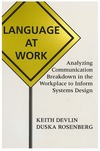

|
|
|
|

Language at WorkAnalyzing Communication Breakdown in the Workplace to Inform Systems Design People are very creative in their use of language. This observation was made convincingly by Chomsky in the 1950s and is generally accepted in the scientific communities concerned with the study of language. Computers, on the other hand, are neither creative, flexible, nor adaptable. This is in spite of the fact that their ability to process language is based largely on the grammars developed by linguists and computer scientists. Thus, there is a mismatch between the observed human creativity and our ability as theorists to explain it. It is in large part through the development of computers that this mismatch has become so apparent. Language at Work examines grammars and other descriptions of language by combining the scientific and the practical. The scientific motivation is to unite distinct intellectual traditions, mathematics and descriptive social science, which have tried to provide an adequate explanation of language and its use on their own to no avail. One of the practical consequences of this state of affairs has plagued the design of computer systems and its interaction with humans. In the past, such problems only came to light once the systems had been designed, installed, and rejected by their human users. The main reason for this rejection is that, although people find it easy and efficient to communicate with other people, the same is not true of their interaction with computers. This volume argues that Situation Theory, a theory of information couched in mathematics, has provided a uniform framework for the investigation of the creative aspects of language use. The future of computer system design can benefit from the application of this framework. The limitations of the scientific background of language studies are far too evident in the obstacles faced by computer systems designers. These limitations lead the designer to focus on either formal or cultural aspects of language use, but do not allow for their integration. In contrast, Situation Theory provides not only the formal apparatus for creating precise and rigorous descriptions, but also permits us to take account of the complexity of the phenomena under study. The application of Situation Theory in the study of language use in everyday communication to improve human/computer interaction is explored and espoused by Devlin and Rosenberg. is Dean of the School of Science at St. Mary's College in Moraga, California. is a lecturer in the Department of Computer Science at Brunel University in London. Both are Senior Researchers at the Center for the Study of Language and Information at Stanford University. Contents
8/1/96 ISBN (Paperback — OUT OF PRINT): 1575860511 (9781575860510)
|
Distributed by the
University of Chicago Press |
|
pubs @ csli.stanford.edu
|
CSLI Publications
Stanford University Cordura Hall 210 Panama Street Stanford, CA 94305-4101 (650) 723-1839 |